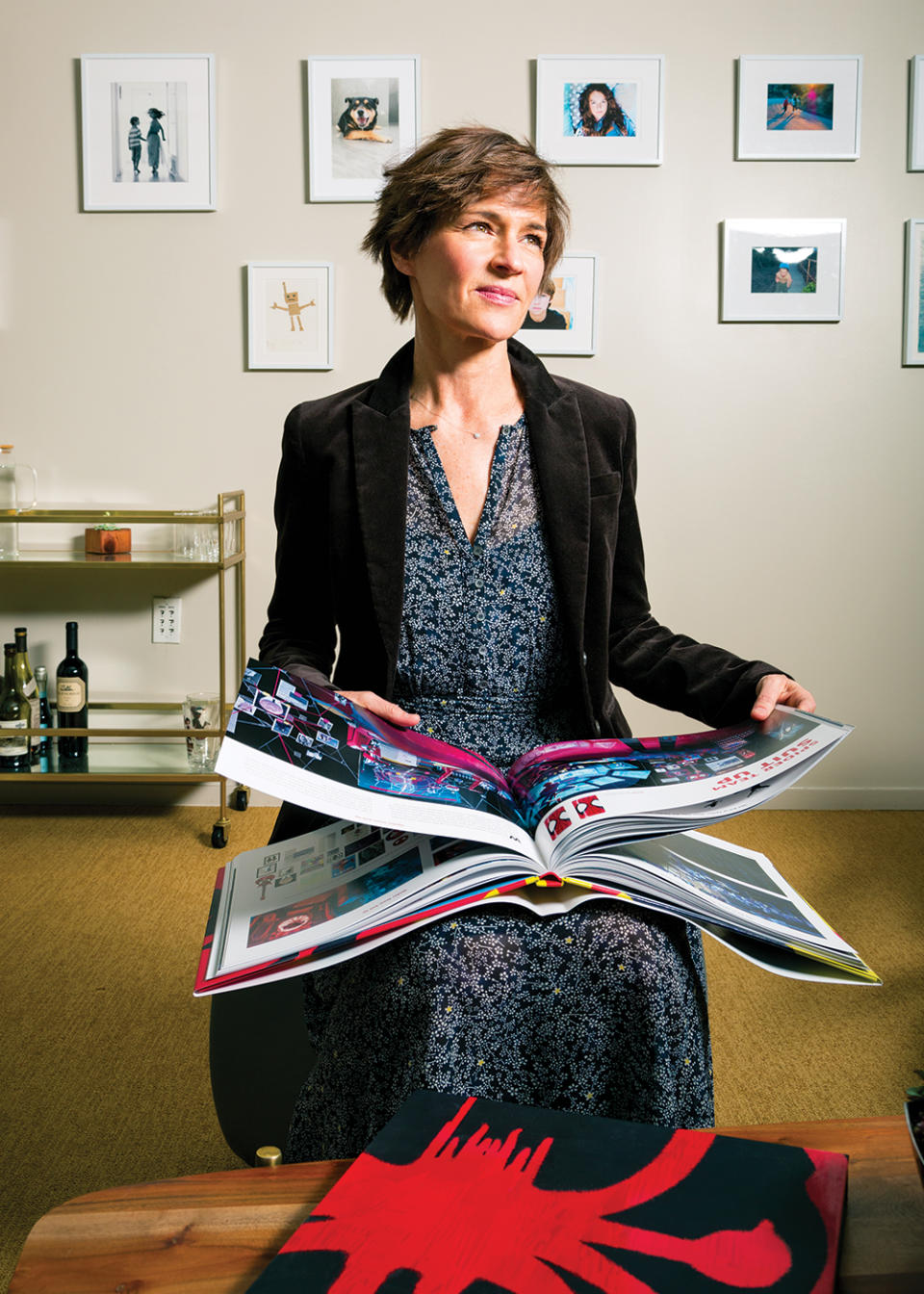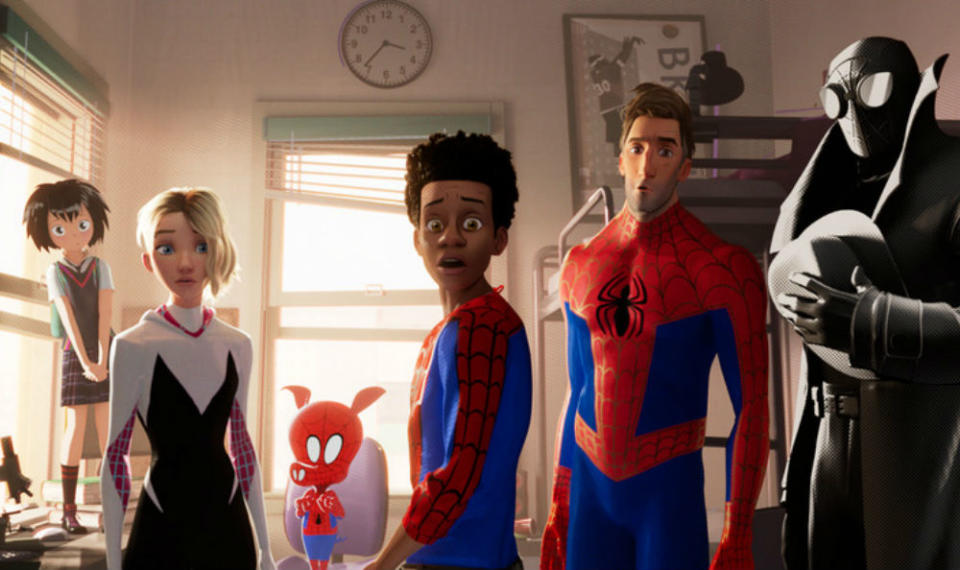How Kristine Belson Turned Up the Heat at Sony’s Sleepy Animation Shop

“There are mimosas upstairs,” a staffer reminds Sony Pictures Animation president Kristine Belson on a recent Friday in her sunny and serene office, just a brisk walk from the studio lot in Culver City, Calif.
Belson waves off the offer. “Not today,” she responds politely. She cites a packed schedule of home entertainment meetings, as well as a conversation with Variety about the studio’s current Oscar contender “Spider-Man: Into the Spider-Verse” and her ambitious upcoming slate.
Related stories
Disney Reportedly Pulls YouTube Ads Over Child-Exploitation Controversy
New Fox Appoints Wayne Borg to Los Angeles Studio Role
Walt Disney Archives Founder Dave Smith Dies at 78
But if anyone should be popping bottles, it’s Belson. After roughly four years in the post, she has transformed a sleepy studio shingle into a global powerhouse, built on inclusion and largely run by women. In addition to her unique leveraging of a certain wall-crawling hero, Belson is preparing three original titles for release over the next two years. She’s made herself indispensable at a time when the shadows of Disney, Pixar and Universal’s Illumination loom large — and smaller competitors such as Sony are scrambling to find new ways to compete.
“I was brought here in early 2015 with this idea of reenvisioning the slate and bringing the studio to greater heights,” says Belson. The idea, she adds, was to produce movies that could break through to a global audience.
Belson explains that Sony wants to make films that are “really bold and different from what you’ve seen before. … All studios and studio heads will talk about being filmmaker-driven, but I am going to suggest that we mean it a little bit more than some other studios do.”
Take “Into the Spider-Verse,” produced by Phil Lord and Christopher Miller, the duo behind “The Lego Batman Movie” and “22 Jump Street.” Against perennial Academy favorite Disney-Pixar — which is once again in the running with a long-gestating sequel to the beloved “The Incredibles” — “Spider-Verse” is an unlikely awards front-runner.
Sony’s unorthodox superhero movie has swept animated film honors at the Golden Globes, the Critic’s Choice Awards, the BAFTAs and the Producers Guild Awards. It seems poised to capture more gold when the Oscars are handed out Feb. 24.
The film also broke barriers, presenting moviegoers with the first Spider-Man of color to appear on the big screen. Critics hailed the picture for injecting wry humor into the comic-book genre (one character, Spider-Ham, presents a porcine version of the web spinner). Audiences agreed: The picture has grossed more than $350 million worldwide.
Some of the willingness to take creative risks is borne out of necessity. Unlike Disney, which also owns Marvel and Lucasfilm, Sony Pictures Animation doesn’t have a vault of much-loved intellectual property to exploit. Only Universal, which hit the jackpot with its acquisition of Chris Meledandri’s hit factory Illumination, has managed to build an animation titan from scratch. The combo has launched the “Despicable Me” franchise.
It’s notoriously difficult to grow an animation division. Warner Bros. has struggled for years to compete with Disney, with flops such as “Legend of the Guardians: The Owls of Ga’Hoole” outnumbering hits like “The Lego Movie.” Paramount has also failed to launch many major animated features of note — even with direct orders to make films in partnership with its sister company, Nickelodeon. Sony’s track record had been mixed, with middling global returns from movies like “Surf’s Up” and better results from “Cloudy With a Chance of Meatballs” and “Open Season.”
When she was brought in by then-Sony Pictures chief Amy Pascal four years ago, Belson was tasked with developing an animated version of Sony’s live-action/hybrid franchise “The Smurfs” as well as extending the life of Genndy Tartakovsky’s “Hotel Transylvania,” a humorous take on monster movies. While “The Smurfs 3” met with mixed reviews and so-so box office, “Transylvania” increased global grosses and enjoyed a stronger critical reception in its second and third installments. The most recent, “Summer Vacation,” bit into more than $525 million worldwide — the franchise’s best performance.
“She spent years in animation working with Jeffrey Katzenberg at DreamWorks, so she had the best teacher in the world,” says Pascal, who has thrice hired Belson to power positions (at Turner, Columbia Pictures — both live-action jobs — and her current gig). “She came with an extraordinary amount of creative drive and practical know-how. I felt she’d be able to turn things up at the company and light it on fire, which is exactly what she’s done.”
“Into the Spider-Verse” was put into production within months of Belson’s hire.
“There’s a bespoke quality to [the division’s] work,” says Sony Pictures Entertainment motion picture group chairman Tom Rothman. “Under Kristine, there’s a great deal of thought and care that goes into everything. They’ve also upped the animation quality and are working with really good filmmakers.”

Belson’s rare position as a female leader in male-dominated Hollywood is not lost on Rothman. “I think it makes a difference having a woman running an animation company in what has been historically a male-dominated discipline,” he says.
To be fair, under a previous regime, Sony Animation’s production was run by two women, Penney Finkelman Cox and Sandra Rabins.
Belson says she is satisfied with the female representation in her division’s executive ranks, which includes production head Pam Marsden and senior vice presidents of creative Jenny Marchick and Karen Toliver. However, she sees room for improvement in the gender makeup of the studio’s creative leadership, a margin she hopes to bolster by the end of 2019. Diversity, she argues, improves the films that Sony Pictures Animation makes.
Belson may be optimistic about the push for gender equity at Sony and other studios, but the animation industry as a whole is still processing Skydance Animation’s decision to hire John Lasseter, the former head of Pixar. Lasseter lost his old job after he was accused of sexual misconduct by multiple employees. It’s been a subject of discussion among employees at Sony Pictures Animation.
“What we talk about is being grateful that this place feels very safe and protected, and that’s pretty much all I want to say about it,” Belson says. “It’s a shame what happened at Skydance. It’s really important for people to feel comfortable and safe to be themselves and do their best work. If we don’t provide that, we’re not going to succeed.”
As she cooks up ways to compete with Disney and Universal, Belson’s approach has been to empower artists such as Tartakovsky or “Into the Spider-Verse” producers Lord and Miller. That’s a rare thing in Hollywood, where Belson says, “the artists [were] working to the goals set by the executives, and when I got here, we said, ‘Let’s turn it upside down.’”
That pledge is evidenced in the amount of resources she allocated to “Spider-Verse,” a process her team estimates took four times as long as the typical animated film production, due to the film’s unique visual language. This entailed animating many of the conventions of comic books: for instance, inserting thought bubbles in a frame within the bigger picture and eliminating the time-saving effect of “motion blur” (which smooths action when animated characters move or speak quickly), and instead layering shots with lines to imply movement.
All that innovation resulted in a significantly longer production schedule in addition to an already lengthy process. A typical animated film produces four seconds of content per week, Belson says. “Spider-Verse” delivered one second per week, which, she admits, was like “flying in the dark.”

Peter Ramsey, one of three directors on “Spider-Verse,” says Belson worked to remove obstacles. “She was an offensive lineman, clearing the way for a lot of the bigger decisions we wanted to make,” he says. “She was instrumental in deflecting hesitancy or pushback from Sony.”
Sony didn’t create Spider-Man and it doesn’t own the rights to the superhero; it licenses them. Under the terms of its deal with Marvel, the creator of Spider-Man, Sony has rights to develop feature properties for approximately 900 comic-book characters. These include everyone from Tom Hardy’s Venom to John Mulaney’s Spider-Pig.
The studio is already at work developing animated Spidey spinoffs but will make good on its promise to support original voices in addition to greenlighting sequels to previous hits.
Belson’s plans include the 2019 release “Wish Dragon,” set in modern-day China and with an exclusively Asian voice cast led by Jackie Chan. The film is written and directed by “Coraline” illustrator Chris Appelhans.
Belson and other executives are also buzzing over “Vivo,” with music by Lin-Manuel Miranda; the animated project centers on an ambitious monkey that travels from Miami to Havana in pursuit of his dreams. Also in the pipeline: Lord-Miller production “The Mitchells vs. the Machines,” about a family battling artificial intelligence.
“It is incumbent on us to present them with ideas that are big and tell those stories in a way that is relevant and funny and compelling.”
Then, perhaps, a mimosa.
Subscribe to Variety Newsletters and Email Alerts!

